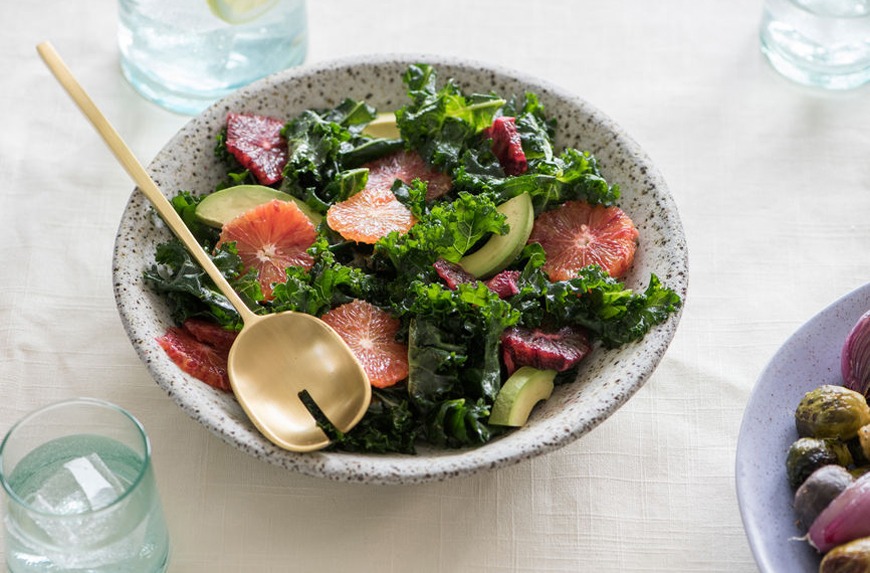Is Cooking for Your DNA the Best Way to Reduce Inflammation and Improve Gut Health?
The burgeoning field is called "culinary genomics," and it's essentially a system for cooking and eating that's informed by the human genome—a blueprint of human DNA.
“Culinary genomics is a revolutionary new way to look at how we choose ingredients, how we prepare them, and how we understand them in order to optimize our health,” says registered dietician Amanda Archibald, a pioneer of the culinary genomics method and founder of The Genomic Kitchen, a company that teaches this new, ingredient-centered system to food selection and preparation. The brand's offerings include online courses, meal planning guides, and healthy recipes.
The Genomic Kitchen isn't the first to bring together diet and DNA. Flavor ID is a California-based food-delivery service that creates personalized menus informed by each client's ancestral roots, while start-up Habit takes things a step further, using a sample of one's blood (and the DNA within) to determine his or her ideal diet. However, The Genomic Kitchen is the first to combine culinary arts, genetics, and nutrition. Archibald teaches her clients not only what to eat, but how to prep and cook the food in order to optimize its genomic benefits.
And the truth is, it’s actually not as convoluted as it may sound. If you’re already a relatively healthy eater, you'll likely only need to make a few tweaks to your diet to get all the genomic benefits you need.

{{post.sponsorText}}
Here's what you need to know about eating for your DNA, the culinary genomics way.

What is culinary genomics?
Here’s how it works: As humans, we all share about 99% of the same DNA. Which is why broad-based health principles, like the good old food pyramid that used to be printed on the back of the Cheerios box, can apply to everyone. Eating for our DNA is no different. Although we all have distinct variants on our genes—which is why some people have a harder time losing weight or may be more prone to gut issues than others—you don’t technically need to have your DNA tested to subscribe to the culinary genomic method. The rules are fundamentally the same for everyone.
“All humans need that same big-picture approach to eating,” Archibald explains. “What we’ve done at The Genomic Kitchen is look at the science of genomics and how our food impacts master genes. These are the genes that direct important processes in the body, like how we deal with inflammation, oxidative stress, metabolism, and gut health. And then, we do our best to optimize these genes through food.” It's healthy eating as seen through a microscope—literally.

How to optimize your DNA through food
So, let’s talk inflammation for a second. We all hear the word and suddenly get stressed out, but Archibald says that we can regulate the master gene that controls this condition by eating certain foods, like cruciferous vegetables. Yup, the same kale, broccoli, and cauliflower you’ve been eating all this time. (See, I told you this wouldn’t be that hard.)
“Cruciferous vegetables are a source of a bioactive called sulforaphane, which helps in igniting the master gene that will manage oxidative stress,” she says. But here's the thing—in order to maximize the bioactive properties of the vegetables, you have prepare them in a specific way, using what Archibald's dubbed the “hack and hold” method. Chop up your cruciferous veggies, let them sit in a bowl for about an hour—in order to give them enough time to release the sulforaphane—then cook them. But be careful not to overcook them, as too much heat will destroy the enzymes within.
Another Genomic Kitchen hack may help improve your metabolism. According to Archibald, incorporating more resveratrol into your diet—the anti-aging bioactive found in the skin of red grapes—wakes a master gene that helps the body burn energy more efficiently.
“Resveratrol turns on the master gene Sirt-1, which works in tandem with other genes to fine-tune how the body handles fat and carbohydrates,” Archibald explains. “The gene helps increase insulin sensitivity, so that we can perfect how the body uses fat and carbs.”
Archibald’s system at The Genomic Kitchen is filled with lots of other ways to eat and prepare foods that can help ignite or mitigate master genes depending on your health needs. They may not sound revolutionary, but Archibald swears those who subscribe to her method will feel the benefits. “If you put all of our systems together, you will basically have a really fine-tuned human,” she says.
Telomeres are another hot topic in DNA science right now—here's how stress and relationships can help or hurt them, impacting your longevity in the process.
Loading More Posts...